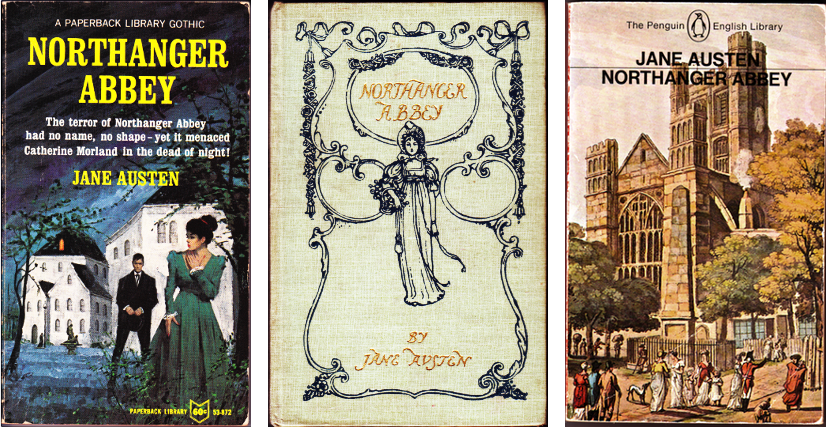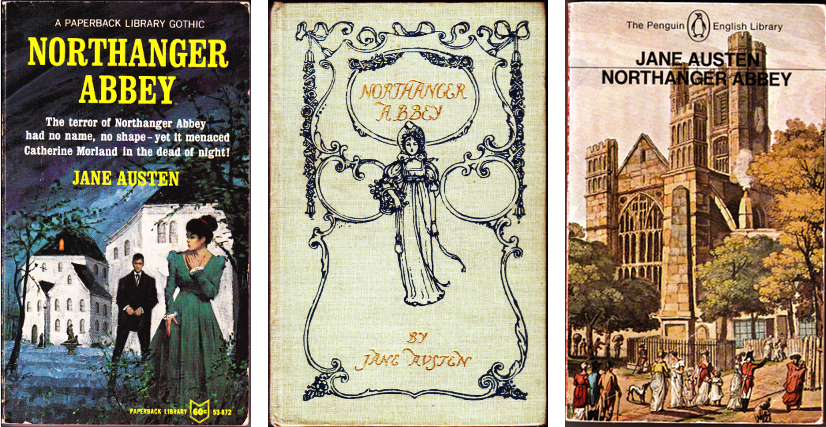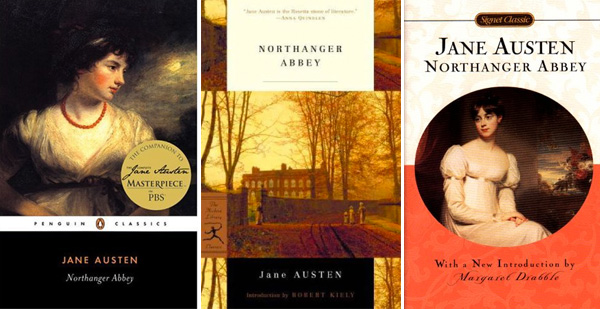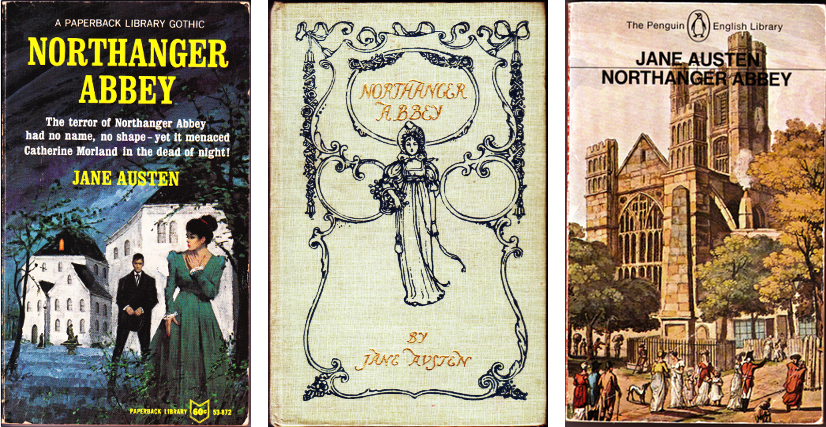IN TRAINING FOR A HEROINE: THE GREAT NORTHANGER ABBEY RE-READ, PART III
Covers from Jane Austen to Cover
Last week on Northanger Abbey, friends became less trustworthy, crushes were deepened, and oafish behaviour was endured. What fresh hijinks will our heroine encounter in the bustling metropolis of Bath? We shall soon see!
Chapter 11
It’s raining! Whatever shall Catherine do? Poor dear is stressed about it all morning, though the weather clears up in the afternoon. Just as it seems Catherine will be able to go for her nature walk with the Tilneys, John, Isabella, and James show up with plans for a day trip to Bristol. Catherine declines—she has plans, after all—but the others brow beat her into coming, Thorpe going so far as to lie about seeing the Tilneys leaving in a carriage. See? This is why cell phones are wonderful miracle boxes we should all be thankful for.
As soon as they set out, Catherine catches sight of the Tilneys coming to fetch her. Catherine is distraught, John refuses to stop his carriage, and I am feeling that second hand embarrassment so hard. Thorpe even has the gall to laugh at her obvious distress. In the end, they set off too late, won’t make their destination before dark, and have to turn back. John is angry, blames James’s slow horse, and mutters things that Catherine doesn’t understand. Something about people having money and not spending it on decent horses? Who knows. They return, spend the evening with the Thorpes, and Isabella plays a card game called commerce (ooh foreshadowing!) and just goes on and on sucking up to James.
Chapter 12
Catherine decides to call on Miss Tilney to clear up the misunderstanding, and heads to the pump room to get the address. (It boggles my mind that the gentry’s home addresses were all written down publicly, but perhaps having a house crawling with servants made break ins pretty rare?) She takes the long way there, in order to avoid “her beloved Isabella and her dear family.” Even if she’s not conscious of it yet, she’s already starting to trust her instincts where they’re concerned. At Eleanor’s house, she is told the lady is out, only to see her exiting the house a few minutes later. Catherine doesn’t allow herself to feel slighted, given her own previous conduct.
At the theatre she sees Henry, and immediately (and adorably) apologizes all over him. He forgives her, obviously, and eases Catherine’s mind. She also learns that she was only ignored that afternoon because Eleanor’s father wanted them to leave, and didn’t want to be waylaid by a visitor. Strangely, John Thorpe and General Tilney (Henry and Eleanor’s father) are seen speaking together.
Chapter 13
Brace yourselves, in this chapter things get real. Isabella has decided that they should try their day trip again, James is eager to please her, and together, with the help of John, they set about trying to persuade Catherine to come. Since she’s remade her plans to walk with the Tilneys, she obviously says no. (Ugh, those three should have a name, don’t you think? The Idiot Three has a nice ring to it.) Catherine is adamant that she will honor her commitment to the Tilneys and no amount of pleading and wheedling will sway her (even when it goes on for pages).
Isabella in particular tries every tactic: appeals to their friendship, accusations that Catherine loves Eleanor more than her, fake crying. It’s a little excessive, and Catherine certainly thinks so. Unfortunately, James decides to chime in and calls Catherine unkind. This is the first time her brother’s disapproved of her, and Catherine is crushed. She proposes that they postpone the trip, but the Idiot Three won’t (obviously, that would be too reasonable). John also refuses to take one of his sisters instead (since Isabella cannot be the only woman).
And then, as if their combined guilt trip wasn’t enough, John takes it upon himself to say that she needn’t worry, he’s cancelled with the Tilneys on her behalf. It’s such a pet peeve of mine to feel not in control of social situations, so I’m just livid on Catherine’s behalf here. She, however, stands up for herself marvelously, and it’s a real moment of growth. She may be malleable and overly trusting, but do not get in between Catherine and what she think is right.
Catherine literally shakes them off, and runs off to the Tilneys’ house, where she bursts in (without waiting for the servant!) and, out of breath, tries to explain the whole thing. She is summarily forgiven and introduced to the Tilney patriarch, who is very solicitous and complimentary (seriously, he even compliments the “elasticity of her walk”). On her way home, Catherine is concerned she may have treated the Idiot Three unfairly but, upon discussing the matter with Mr. Allen, concludes that it wouldn’t have been proper for her to go.
Chapter 14
Bolstered by Mr. Allen’s approval, Catherine wakes eager for her day with the Tilney siblings. They quickly begin discussing novels (leitmotif!) and Catherine assumes Henry will have no time for such frivolous reading. But our dashing hero surprises us all by disclosing that not only does he read novels, he devours and loves them. There’s also no added dismissal with Henry, he genuinely respects these books (which nicely sets him apart from John). The whole dialogue between Catherine, Henry, and Eleanor is wonderful, and we fully get to know these characters. So much so, in fact, that I’ll talk a bit more about it below. They eventually return home, and Catherine learns that Isabella, James, and John did in fact go on their trip, accompanied by a younger Thorpe sister.
Chapter 15
The next morning Catherine receives a letter from Isabella, urging her to come over. Catherine complies and, while waiting for Isabella to come down from her room, chats with a younger Thorpe sister. Having the exaltations of these characters relayed by the narrator is such a masterful stroke. Just listen: “Catherine immediately learnt that it had been altogether the most delightful scheme in the world; that nobody could imagine how charming it had been, and that it had been more delightful than anybody could conceive.” Only the best from Jane “Sassypants” Austen.
Catherine is satisfied that she didn’t ruin her friends outing. (Though only one of the Thorpe sisters was allowed to accompany the Idiot Three, John wouldn’t take the other one due to her thick ankles. John. Real talk. Why are you the worst?) Just then, Isabella walks in and proclaims that it’s true! You’ve guessed it!
“Catherine replied only with a look of wondering ignorance.”
As it turns out, shocker, Isabella and James are engaged. Isabella waxes poetic about love at first sight and the closeness of sisters, and tells Catherine that James is on his way to ask his parents’ consent. Isabella is worried that their difference in fortune will be an impediment, and Catherine has no idea what she’s talking about. The next day, a letter arrives from James easing Isabella’s fear. The Morlands are happy with the match. John corners Catherine before leaving as well, talking about how great weddings, are and how there shouldn’t be just one, and how alike the two of them are. Catherine has absolutely no idea what’s going on. It’s perfect.
Commentary
This batch of chapters kicks off with a wonderful dissolution of the gothic novel. Being kidnapped by the rakish villain isn’t nearly so much fun in real life, is it Catherine?
The main thrust of this section, however, seems to be showcasing how different the Thorpes and Tilneys really are. Obviously, Isabella and John will stoop shockingly low to get what they want, even indulging some pretty blatant and unapologetic deceit. (Not to mention the emotional abuse of making Catherine feel like the villain for having boundaries.)
Isabella’s card game scene in particular is priceless. She just will not stop talking about how city life is so awful and the country is so great and she would just love to spend her whole life in the country. Come on now James, this isn’t hard to figure out. Isabella is hard core playing you and is not even bothering to be subtle about it. Get yourself together Jaimie-boy, she’s even losing the game on purpose to gush about your victory. Oy vey.
So, if it wasn’t clear before, it’s painfully obvious now that neither John nor Isabella is to be trusted. At all. Ever. They’re both inconsiderate, manipulative, and uncaring, and it’s a testament to both James and Catherine’s good natures that the two pairs of siblings’ relationship has lasted even this long.
In contrast, I’d like to dissect the conversation Eleanor, Henry, and Catherine had during their walk, because it really does bring home how mutually respectful and honest the three of them are together. Even when Henry is teasing (which he does quite a lot of this time around), it’s all toothless and good-natured. For example, there’s a fun little aside in which Henry derides the overuse of “nice” as an adjective (“this is a very nice day, we are taking a very nice walk, and you are two very nice young ladies. Oh! It is a very nice word indeed!”). He’s only gently poking fun, and it’s difficult to imagine John treading so softly. It’s also a strangely modern complaint, and it really cements my belief that Northanger Abbey is ripe for a modern retelling. (Seriously can we get the creators of The Lizzie Bennett Diaries to do a series on Bath University freshman Cathy?)
Their talk turns to other literature, and Eleanor professes her love of histories. Catherine can’t get into them, citing as reason that “the men [are] all good for nothing, and [there are] hardly any women at all it is very tiresome.” Oh my adorable budding feminist. (This is the part where history student Cathy takes her first women’s studies class and has to rethink her major.) Again, it’s hard to imagine this sort of conversation happening with the Thorpes. Not only are their interests decidedly elsewhere, but there just isn’t the intellectual space in that group for Catherine to flourish.
Sadly, the topic of conversation then shifts to one Catherine can’t contribute to, but that’s alright, says Austen, being ignorant is good when you’re trying to appeal to the vanity of someone else. “A woman especially, if she have the misfortune of knowing any thing, should conceal it as well as she can.” Well that was a short-lived feminist high. I know you’re probably being facetious, but you disappoint me, Jane.
Moving on, there’s a funny moment where Catherine talks about a scandalous new novel rumored to be out soon in London, and Eleanor mistakenly believes she’s talking about actual violence in the city. (There was quite a lot of civil unrest in the 1790s, so her fears are justified.) I’d mentioned before that Henry has the potential for condescension, and here we get the first glimpse of it. He makes fun of both ladies, and come on dude, chill out. It was a misunderstanding. Stop acting so superior. But then Eleanor gets mad at him and forces him to acknowledge that he thinks “very highly of the understanding of women.” He does so gladly. Feminist happiness restored.
Catherine is significantly more at ease around the Tilneys, and in the coming chapters she’ll learn to trust that instinct more and more. But we’re not out of the woods yet! There’s more Thorpe-centric drama to be had but, for that, you’ll have to wait until next week.




